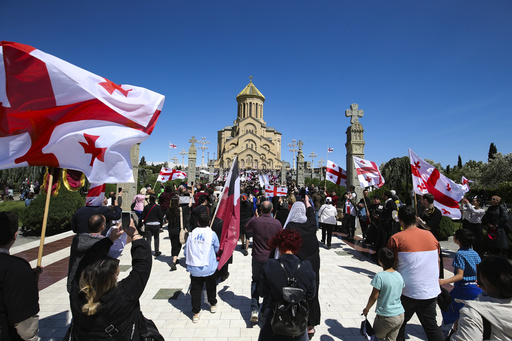TBILISI, Georgia (AP) — Georgia’s prime minister joined tens of thousands of people on a march through the capital on Friday to mark the Day of Family Purity, which celebrates so-called traditional family values in the country where animosity toward sexual minorities is strong.
Observances of the day, which was initiated by the Georgian Orthodox Church in 2013, were also held in more than 20 other cities. Many of those in the Tbilisi procession carried icons and Christian emblems and wore traditional costumes with intricate patterns..
Liberal groups have complained that the event coincides with the International Day Against Homophobia, Transphobia and Biphobia.
Prime Minister Irakli Kobakhidze and parliamentary Speaker Shalva Papuashvili were among those who marched in Tbilisi. The march ended at the capital’s Trinity Cathedral, where Kobakhidze praised the event for “protecting the country’s identity, language and faith.”
“We are Georgians, and for us, faith is very important. It has withstood centuries, and it is important to stand together and defend our faith by all means. Our ancestors defended it in battles throughout the years and centuries, and it is our obligation to defend it as well,” said march participant Rusudan Tabatadze.
In March, the ruling Georgian Dream Party introduced a bill curtailing LGBTQ+ rights. If adopted, the bill will prohibit sex changes, adoption by same-sex couples, and gatherings that could be regarded as promoting same-sex relations.
Georgian Dream also has pushed through a bill to require news media and nongovernmental organizations to register as “agents of foreign influence” if they receive more than 20% of their budget from abroad. The bill set off mass protests this month in Tbilisi. Opponents refer to it as “ the Russian law ” because it resembles regulations in Russia.
President Salome Zourabichvili says she will veto the measure, which opponents say will obstruct Georgia’s bid to join the European Union, but its supporters have enough seats in parliament to override a veto.
Tension in Georgia over unorthodox sexual mores is strong. Last year, hundreds of opponents of gay rights stormed an LGBTQ+ festival in Tbilisi, forcing the event’s cancellation.
This website uses cookies so that we can provide you with the best user experience possible. Cookie information is stored in your browser and performs functions such as recognising you when you return to our website and helping our team to understand which sections of the website you find most interesting and useful.
